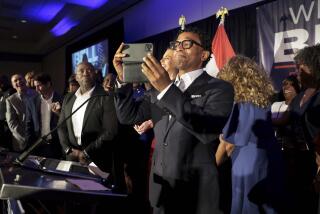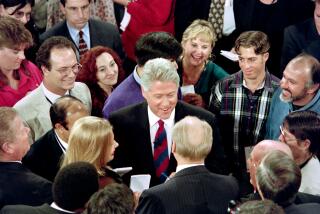Primary Elections 1992 a Devil to Predict
- Share via
Gosh, I’m glad the primaries are over. The suspense has been killing me.
I remember way back in January when George Bush was running against Pat What’s-His-Name. Golly, that was an exciting contest.
I can’t remember exactly what it was all about. But I do know I wrote a lot of stories about it.
And the Democratic race was even more compelling. Just who would the Democrats choose? Bill Clinton or Paul Whoozis or Jerry Whazis?
Talk about being on the edge of our seats.
Now, to the victors go the spoils. They get the nominations of their parties.
This means Bill Clinton gets to go to New York in July and George Bush gets to go to Houston in August.
So there is some justice in this world.
One of the best things about the primaries of 1992 is how they defied all prediction.
In 1988, the two candidates who raised the most money were George Bush and Michael Dukakis. And they ended up getting nominated.
In 1992, however, the two candidates who raised the most money were George Bush and Bill Clinton. And they will end up getting nominated.
See what I mean? A total bolt from the blue! You can appreciate why this political analysis business is so tough.
Why does raising money matter so much? Well, just look at where the money goes: An enormous amount of the money spent in political campaigns goes to raise more money.
In other words, you have to pay people to raise money so you can use that money to pay the people to raise it.
But what do you do with money besides spending it to raise more? Well, you use it for TV ads.
Millions and millions of dollars are spent on TV ads. If television stations banned political advertising tomorrow, political campaigns would not know what to do with their money.
They would probably just leave it sitting around in stacks and the cleaning people would have to throw it out.
TV political ads fall into three categories: Those that get your face known. Those that attack the other guy. Those that defend you from attacks by the other guy.
And though most normal Americans cannot remember a political ad for more than 90 seconds after watching it, campaigns devote an extraordinary amount of time and effort to them. That is why this year we saw the extraordinary phenomenon of the No. 2 Democratic candidate dropping out of the race because he didn’t have enough money to buy his own ads to respond to attack ads.
Paul Tsongas had been beaten up by Bill Clinton’s ads in the Florida primary, and Tsongas just didn’t have the money to run his own response ads in the New York primary. So he quit.
Me, I would have just slapped a bumper sticker on my forehead that said: “Clinton Is a Big Liar. Don’t Believe Him.”
And that way every time TV took my picture, I would get a free ad.
But Paul Tsongas dropped out. He had scores of reporters following him around each day. He had immediate access to every major news outlet in the country. But he had to drop out because he didn’t have the money to run ads.
Clinton, by the way, is now $2 million in debt.
I never understand how these campaigns get in debt. Oh, I know they spend more than they take in. What I can’t figure out is who would be goofy enough to give credit to a presidential campaign.
Clinton recently sent out a six-page fund-raising letter urging people to give him more money so he can keep his campaign “functioning at the level needed in the next six weeks.”
One of the things he reportedly wants to do between now and the Democratic Convention is to “keep a high profile by appearing once a week in 30-minute prime-time TV spots.”
And these 30-minute spots could cost Clinton a ton of money:
First, he would have to buy the TV time for the spots.
And, second, he would have to buy all that rope to tie us into our chairs to make us watch them.
More to Read
Get the L.A. Times Politics newsletter
Deeply reported insights into legislation, politics and policy from Sacramento, Washington and beyond. In your inbox twice per week.
You may occasionally receive promotional content from the Los Angeles Times.










